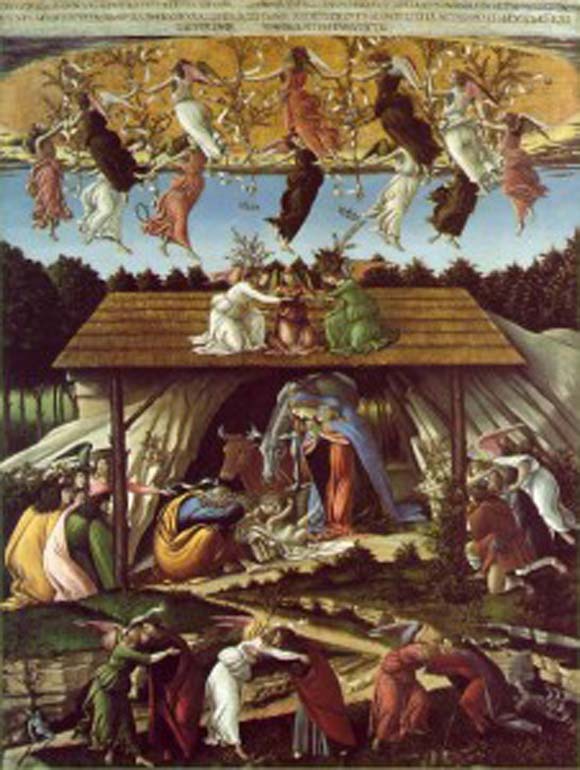
Christmas Day
706
Readings – Midnight Mass: Isaiah 9:2-7; Titus 2:11-14; Luke 2:1-14; Mass at Dawn: Isaiah 62:11-12; Titus 3:4-7; Luke 2:15-20; Mass During the Day: Isaiah 52:7-10; Hebrews 1:1-6; John 1:1-18
The moon contributes significantly to a peaceful nightscape but it cannot itself be described as a peaceful place. This is because there is no life on the moon. Where there is no life there is no struggle or anxiety, there is no need or threat or fear. If the moon is peaceful then it is the peace of the graveyard, the kind of peace found in dead places and not the full, rich, reconciled, healed, and justice-based peace that the Bible calls shalom.
The earth is not at all like the moon. Here there is life, many kinds of living things, and so there is much struggle and anxiety, there is need and threat and fear. Where there is life there is the possibility of it being damaged, wounded, and even lost. Living things are aware of their surroundings and must keep watch and be attentive. Living things are always anxious or at least alert and they are always needy, for food, for shelter, for a mate. Where there is life there is also threat and fear, even (perhaps especially) from other living things of the same kind.
So the earth, in particular the human world, is a place that needs justice, some kind of management and balancing of struggle and anxiety, of need and threat and fear. Inevitably, we contend with each other. We jostle with each other for food and influence. We are aware of each other as potential partners and friends and collaborators but also as different, as rivals, as perhaps not fully trustworthy, not really ‘on my side’.
The human world remains a place where we must strive for justice although it often seems to be beyond us. Where people take action to restore or introduce justice they often end up doing some fresh injustice. Where one kind of exclusion, discrimination or inequality is removed, fresh kinds of exclusion, discrimination or inequality appear in their place.
Jesus was born and lived in Palestine, the place where Europe, Africa and Asia meet. It was a key province of the Roman Empire, guarding the great trade routes to the East and to the South. For centuries it had been fought over by Egyptians, Assyrians, Persians, Greeks, and Romans. Even today ‘Palestine’ represents the knottiest of human problems. It is the place where Jews, Christians and Muslims struggle to live together in justice and in peace. There are many other places where cultures, languages, races, and religions meet and where they must find out how to live together. But ‘Palestine’ is symbolic of them all.
Jesus was born into this knot in the world’s history and geography. We believe him to be the promised Messiah, the one who would initiate God’s reign of shalom. The word means peace but not just in the sense of no fighting. It means a rich, reconciled, healed, justice-based peace, the peace that comes with the Messiah, a peace that is won, as it turns out, through His rejection, death and resurrection. Many biblical texts speak about the Messiah as one who would bring a definitive reign of peace. In fact ‘he himself will be peace’ (Micah 5.4) and ‘in his days justice will flourish and peace till the moon fails’ (Psalm 72).
The Greek philosopher Aristotle wrote the first book to be called Politics and in it he says that human community and civilization are built on communication. It is by talking and listening that we recognize and establish justice. Thomas Aquinas liked the idea: ‘communication builds the city’, he says, commenting on Aristotle’s text. It is part of human greatness that we understand the need for justice and can work together to try to build it. And we build it through listening and talking together.
The Word became flesh in Palestine. Into the knot of human struggle and anxiety, of need and threat and fear, God entered to speak His Word. Jesus is God’s final contribution to the human conversation about justice and peace. We will find peace, he says, by following him in loving our enemies. Learn from me, he says, for I am gentle and humble of heart, and you will find rest for your souls. ‘You must love one another as I have loved you.’ People may feel, and sometimes say, that it is impractical and naïve, this law of love to which Jesus calls us. In this world, with its tensions and anxieties, its needs and threats and fears, it is easy to see why people would feel and say that. But Jesus has overcome the world and has started a new creation in which love is the only law. Those who live by that law already experience the peace he promises, a peace beyond human understanding, a peace this world cannot give.


